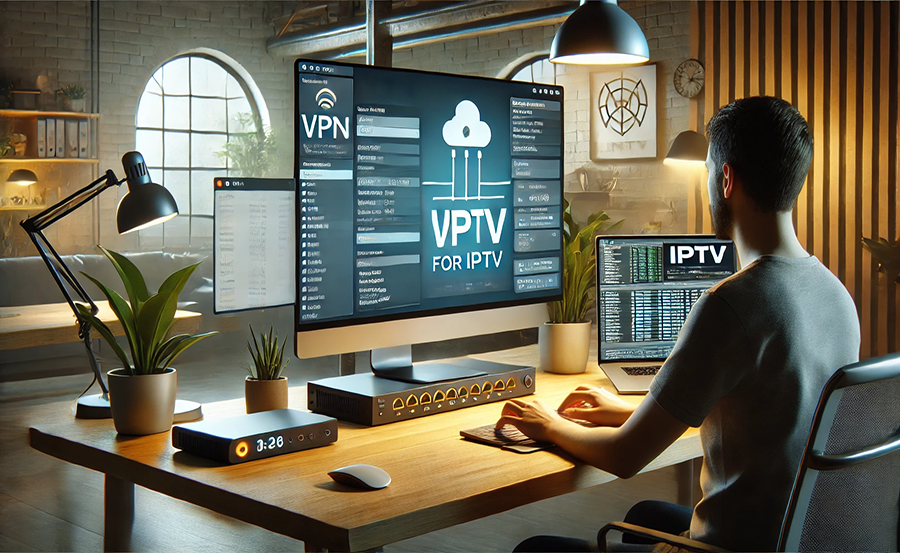In today’s digital age, streaming content has never been more accessible, thanks to innovations like IPTV (Internet Protocol Television). For tech-savvy users, particularly those utilizing Linux systems, managing IPTV access efficiently is crucial. Combining IPTV with VPNs (Virtual Private Networks) can maximize accessibility while enhancing security. Let’s explore how IPTV and Linux work together, and why Rapid IPTV stands out as the premier global choice for IPTV subscriptions.
Understanding IPTV: A Brief Overview
IPTV has revolutionized the way we consume television. Rather than relying on traditional terrestrial, satellite, or cable television formats, IPTV uses the internet to deliver TV programs and video on demand. This efficient delivery method offers numerous benefits, including a diverse range of channels and content tailored to international audiences.
What makes IPTV particularly appealing is its adaptability, offering seamless integration with a range of devices and operating systems, including Linux. As IPTV popularity grows, so does the need for secure and unrestricted access, which is where VPNs come into play.
Quick Tip:
Get a full year of streaming with 1 Year IPTV Subscription, bringing you all your favorite channels and exclusive content.
How IPTV Functions
The way IPTV works is straightforward yet ingenious. Content is transmitted via a broadband connection to a set-top box or directly streamed to compatible devices. This internet-dependent system means users can choose what they want to watch and when they want to watch it, unhindered by typical broadcasting schedules.
Internet connectivity acts as the backbone of IPTV services, providing users with flexibility and control. However, this dependence also means facing geographic or copyright restrictions, which VPNs can help circumvent.
The Role of Linux in IPTV
Linux, known for its open-source nature and robust performance, offers a reliable platform for streaming IPTV content. Many Linux users appreciate the system’s flexibility and customization options, enhancing their IPTV experience.
The open-source community continues to develop tools and applications, enabling seamless integration and performance of IPTV on Linux systems. These advancements ensure that users can enjoy smooth, uninterrupted streaming experiences.
The Significance of VPNs in IPTV Streaming
VPNs (Virtual Private Networks) play a pivotal role in securely accessing IPTV content. By encrypting internet connections, VPNs protect users from hackers and ensure privacy. This encryption is significant when accessing international content or using public networks.
Moreover, VPNs can help bypass geographic restrictions, providing access to a wider variety of channels and shows. For Linux users, leveraging VPNs with IPTV ensures a safe and versatile streaming environment that is both private and unrestricted.
Securing IPTVs on Linux
Securing IPTV streams on Linux involves a thoughtful combination of technology and best practice strategies. Users can employ VPNs to create a secure tunnel for internet communications, shielding them from potential threats.
The Linux platform, with its innate security features, provides an additional layer of protection, making it a preferred choice for tech enthusiasts seeking to safeguard their IPTV activities effectively.
Unlocking Global Content
Through the use of VPNs, Linux users can unlock a world of global content, bypassing pesky geo-restrictions. Whether it’s a regional sporting event or an international news channel, VPNs make it possible to access this content with ease.
For digital nomads and expats, this capability is particularly valuable, allowing them to stay connected to channels from their home countries while exploring new cultures and perspectives from around the world.
Why Choose Rapid IPTV? Exploring the Advantages
Rapid IPTV has established itself as a leader in the IPTV industry, offering a subscription service that’s both affordable and quality-driven. Here, we’ll break down what makes Rapid IPTV the ideal choice for users worldwide.
From competitive pricing to diverse channel offerings, Rapid IPTV stands out in providing a reliable and comprehensive solution for streaming enthusiasts looking for the best IPTV experience.
Key Features of Rapid IPTV
- Vast Channel Selection: Over thousands of channels from various countries.
- High-Quality Streams: Featuring HD and UHD streaming options.
- User-Friendly Interface: Easy navigation and intuitive controls.
- Reliable Service: Consistent uptime and minimal buffering issues.
Affordability Meets Quality
In the competitive market of IPTV, pricing plays a crucial role in decision-making. Rapid IPTV offers a cheap international IPTV solution without compromising on quality. Customers appreciate the balance of cost-efficiency and exceptional streaming experience.
This pricing strategy, combined with the company’s unwavering commitment to quality, positions Rapid IPTV as a go-to provider for streaming content across the globe.
Customer Support at Its Best
Another standout feature of Rapid IPTV is its exceptional customer service. Users of all technical abilities can rely on their support team to resolve any issues swiftly and efficiently, enhancing the overall customer experience.
The company’s dedication to service excellence ensures that users have assistance whenever needed, making rapid IPTV a highly recommended choice for both new and experienced users.
Setting Up Rapid IPTV on Linux
Setting up Rapid IPTV on a Linux system is straightforward. The process involves a few simple steps that ensure you’re up and running quickly, without unnecessary hurdles.
Here’s how you can get started with your Rapid IPTV subscription on a Linux platform, making your streaming personal, seamless, and enjoyable.
Initial Setup Steps
To start, obtain your Rapid IPTV subscription and credentials. Once you have that, install the necessary IPTV player compatible with Linux, such as VLC or Kodi.
- Download the player from a trusted source.
- Install and launch the application.
- Enter your Rapid IPTV credentials to log in.
Troubleshooting Tips
Despite a smooth setup process, users may occasionally encounter issues. Checking internet connectivity, ensuring all software is up to date, and reviewing configuration settings are typically effective first steps in troubleshooting.
For more persistent issues, referring to community forums or contacting Rapid IPTV’s customer support can provide additional guidance and solutions.
VPN Configuration on Linux for IPTV
Configuring a VPN on Linux for IPTV streaming is vital for both security and access to geographically restricted content. Below are the step-by-step instructions to get your VPN working efficiently with Rapid IPTV.
Understanding these configurations will empower users to unlock optimal viewing experiences, fully tapping into the potential of their IPTV subscription.
Choosing a VPN
Choosing the right VPN is crucial. The ideal VPN should offer fast speeds, strong privacy policies, and servers in the desired regions. Look for VPNs with compatibility features for Linux systems, ensuring seamless integration with IPTV.
Once you’ve selected a suitable VPN, ensure you stay updated with the latest software versions, keeping your IPTV setup secure and efficient.
Installation and Configuration
Installing a VPN on Linux involves downloading the VPN client from a reputable source followed by the installation process specific to your Linux distribution. Once installed:
- Launch the VPN application.
- Connect to a server that supports IPTV streaming.
- Ensure your connection is secure before starting any streams.
Optimizing Performance
To maximize performance, consider connecting to servers geographically close to your location, ensuring faster speeds and reduced latency. Regularly checking for updates and maintaining an optimal network setup can significantly enhance streaming quality.
Users should also customize VPN settings based on their preferences, balancing security and performance as needed.
Maximizing the IPTV Experience with Linux and VPNs
Combining the power of IPTV with Linux and the added security of VPNs creates an unparalleled entertainment experience. These technologies work in tandem to broaden content accessibility and protect user data effectively.
By choosing Rapid IPTV, users can be assured of a comprehensive service that meets their streaming needs while offering excellent value and support.
Balancing Security and Accessibility
When using IPTV on Linux with a VPN, it’s essential to balance security with accessibility. While VPNs offer necessary protection, choosing the right server and configuring settings can optimize speed and access quality.
Regularly reviewing and updating VPN settings can maintain this balance, providing an optimal streaming experience free from interruptions or security threats.
Future Trends
With advancements in technology, the IPTV landscape is set to evolve, offering even more sophisticated features and integrations. Linux users, in particular, can anticipate improvements in compatibility and functionality.
Staying informed about these trends allows users to adapt quickly, ensuring they always have access to the best IPTV experience possible while leveraging the latest in tech advancements.
Frequently Asked Questions

What makes Rapid IPTV subscription stand out?
Rapid IPTV stands out due to its vast channel selection, reliable service, affordable pricing, and excellent customer support, offering users a superior streaming experience worldwide.
How does a VPN enhance IPTV streaming on Linux?
A VPN enhances IPTV streaming by encrypting data, securing the connection, and allowing users to bypass geographic restrictions, thereby accessing more channels and content safely.
Are there free VPN options for Linux IPTV users?
While free VPNs are available, they often have limitations such as slower speeds, data caps, and fewer server options. For optimal performance and security, investing in a reputable paid VPN is recommended.
Can I install Rapid IPTV on devices other than Linux?
Yes, Rapid IPTV is compatible with various devices, including those running Windows, macOS, Android, and iOS systems. This compatibility allows users to enjoy IPTV across multiple platforms seamlessly.
What if I encounter issues while setting up Rapid IPTV or a VPN?
Should setup issues arise, users can consult the extensive support resources offered by Rapid IPTV and their VPN provider, including guides, forums, and customer service for troubleshooting assistance.
Embrace the possibilities of IPTV on Linux with Rapid IPTV and VPNs. It’s about enjoying a world of content securely and reliably, maximizing technology as never before.
Using Third-Party Apps to Stream IPTV on Older LG Smart TVs

